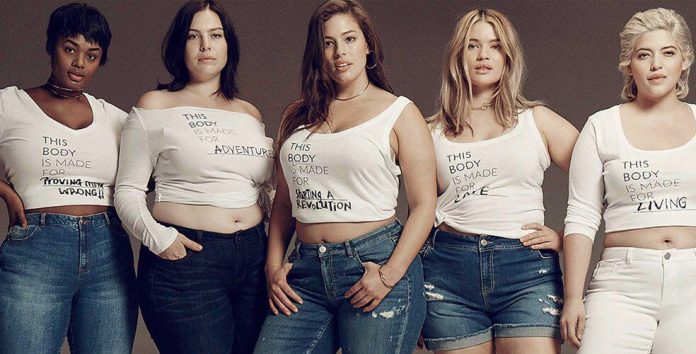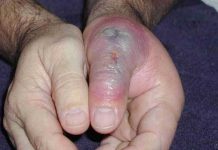So you have a body. And you’re positive. Congrats, you’re body positive. But I want to delve deeper into this public display of acceptance which is sweeping Instagram and leading brand campaigns, and see if body positivity can outlive the cut-throat turnaround of Fast Fashion, or if it is just another trend to be cast aside to the bargain bin with stretch chokers and disco pants.
The fast-fashion industry is currently riding a wave of self-acceptance, with industry power houses Missguided and PrettyLittleThing taking the lead with their inclusive campaigns. Featuring “plus” (I won’t dive into the irony of celebrating “everybody” whilst listing them as plus size aka bigger than “normal”) sized girls and those with “imperfections” (Are freckles really a flaw?) these brands promise to encourage you to “Keep on being you”, but what happens when the trend runs thin, does the acceptance and positivity disappear too?
This isn’t a straight topic, and it doesn’t have a black and white answer. I know the counter-argument will be that the hope is these brands will continue to move forward with their inclusivity, and the trend will never die. But this is fashion. And what’s hot right now will be more, not, in a couple months time. You see, my issue is- I struggle with the authenticity of the body pos’ movement within the fashion industry, and how they claim to represent all women and men, whilst well, not representing all women and men. Is that even possible? And is the industry venturing into murky waters- making fashion all about the models, instead of the clothes they’re wearing?
The inclusion of models who are a variety of sizes is and should be- welcomed in fashion, and in all aspects of advertisement for that matter. But there is a salty-ness in the air towards the models who have traditionally been represented. Get this girlfriends, we can lift ourselves up without putting anyone else down. Sounds crazy right? The example which stands out for me on this dates back to when I was watching the Lorraine show a year or two ago. She had Hayley Hasselhoff, a “plus” sized model on who was discussing her career after recently attending one of the many fashion weeks held Worldwide. Both women gagged and cackled at how “those other models look like they need to eat” and that “they were probably starving backstage!” All the while whilst championing body positivity and applauding women for their confidence. In typical “millennial being offended by everything” style I sent out a tweet highlighting the irony in their display, in which Hayley replied something along the lines of how “it wasn’t intended like that”. And I’m sure it wasn’t. But here’s where it get’s confusing. Body positivity is not engrained in us. Society has not raised us through generations to look at every body as being beautiful. To look at our bodies as being beautiful. Subconsciously, we forever lift one ideal up by stamping on another. Comparison and competition is within our blood. And a couple of money-making campaigns encouraging us to “feel good” is not going to knock the ancient judgement out of us. Is it really possible for us as a society to embrace and accept our bodies as beautiful?
A more recent example of this is US-underwear brand Knix and Simply Be’s “We are all Angels” campaigns who, using ‘plus-sized’ models, launched a press campaign alongside the annual Victoria’s Secret show which took place last month. The problem with this statement is: No we’re not. And that’s okay. We don’t all need to be angels or held at that standard. We are after all, more than our bodies. This may be controversial, but there is a reason that these women are positioned on a hierarchy on this specific platform- they work fucking hard for it, their whole career’s, to walk that one show. The VS brand is built on striving for the out-of-this worldly looks of the angels, it was never created to be relatable or to represent “real” women (That expression in itself grinds my gears- you identify as a woman? You’re a real woman. Simple as) As their head of creative Ed Razek controversially stated, the show is intended to be a 42 minute “fantasy”. Now, this absolutely does not mean I don’t think there should be a more diverse representation on the VS catwalk; And for Ed Razek to argue that “no one had any interest” in seeing plus size girls in the VS show because of an unsuccessful attempt to cast over a decade ago is out of sync with the industry and it’s new direction. However I’m just calling for models to be cast because they’re good at their job (HELLO Ashley Graham and Iskra Lawrence as perfect candidates for this!), instead of using models to fulfil and push a political agenda that doesn’t adhere to their brand image. I also strongly believe that VS should never rule out using transgender models because these women are fucking taking over the World right now, and Carmen Carrera would slay those angel wings. However, this time of year always see’s “pro body pos’” brands come out to attack the angels with counterpart campaigns and it just does not sit well with me. We can all feel beautiful and accept ourselves for who we are, without quaffing at the achievements of others in return.
Another side note to this is the argument that these VS models represent an unrealistic body image. Being 5ft 11 inches, with long legs and a 30 inch’ hip width is unrealistic to me. As is the opposite end of the spectrum. But this doesn’t mean it is unrealistic to every single person out there. Being impeccably ripped is unattainable for me, because I won’t put in the hours to achieve this, but it’ not unachievable. Someone out there will put the hours in, and will achieve and attain that body image. It just won’t be me. And that’s fine. We need to be careful with who we alienate and who we are putting down when we are attempting to applaud multiple beauty ideals. Seriously, what do you mean by a real woman? I fucking hate when people use that phrase.
Another one of my issues with the body pos’ movement is its representation of sizes. You have your slim (size 6-8) and your “plus” (size 16-18), but where the fuck is the middle people? Where are the women that me and my friends can relate too? Yes, it’s time to get out your tiny violins folks and check my priveledge, but in all seriousness the industry seems to ride this body pos’ wave for profit by using one extreme representation to another. These brands drill into us that we are all beautiful, whilst ignoring an array of sizes and heights and shapes and curves. And I’ll be damned if I see a 5ft 4′ girl with huge tits, or a pear-shaped “plus” sized girl grace the campaigns of these brands. SURE they’re using females who are more shapely than the traditional castings, but these women are still models. They’re still perfectly in proportion and fit into their sample size whilst being 5ft 11′ with perfect teeth. Of course they’re fucking beautiful. That’s their job. We sit at home scoffing in excitement that a brand uses someone with stretch marks who’s face was carved by the Gods and forget that although we can relate to these small flaws, these women were picked from an agency who accepted them onto their books because of their model-esque beauty. I’m not saying this is wrong. There is a reason models are models. But the way these brands capitalise on “normal” peoples’ insecurities whilst using ridiculously beautiful women seems hypocritical to me. Just don’t mention it, and use them as the norm. Make them as aspirational for us as consumers as any other model used is, instead of attempting to make us relate to these goddess-like females on a “we both have stretch marks” level to sell a couple of GRLPOWER tee’s.
And lastly, my question is HOW? How do I feel beautiful in your clothes when they’re still too long for my short stumpy legs? How do I feel confident in your tops when my boobs poke out the bottom? How do I “make my mark” when I can’t get these jeans up over my hips? You can throw all the two-minute body pos’ campaigns at me in the World, and I’ll still feel shit about my rolls and how your sizing is off, forcing me to buy a size bigger and feel even shitter about myself than before. Cater to what you’re trying to achieve, we are begging you. So what happens now? Where do we go from here?
A brand who I believe is leading the pack when it comes to body pos’ right now is Savage X Fenty by Rihanna. Their debut fashion show showcased women of all shapes, sizes, skin colours, and even some heavily pregnant models. The show withheld an aspirational and inspirational ideal of beauty and fashion whilst representing all females. The products and design element were not pushed aside for a political agenda and the creative aspect of the catwalk was simply iconic. If anyone needing schooling on how to empower all women to feel sexy, then this is the brand for you. However even Rihanna can’t bypass criticism when it comes to this movement. The brand has been criticised for promoting their products using ‘plus’ sized girls, whilst their sizing only goes up to a DD. And some of the images used to promote their underwear has seen women’s boobs poking out the bottom of the bra’s and overflowing at the top, begging the question are they really catering for all women, or pushing this as an agenda to drive sales?
The issue with body positivity, is that you can’t please everyone. It is impossible to represent every single shape and size and height and imperfection in the fashion industry. And whilst diversity should be applauded, no amount of fashion campaigns can make me love my cankles, or make me not have to turn my trousers up for being too long. Brands make these bold statements preaching how we should all love ourselves, without giving us the steps on how to get there. And of course they haven’t, they’re fashion brands, not our therapists. But when claiming ownership towards our feelings through their campaigns, these brands need to take some responsibility of the sheer volume of the task they’re putting upon us. Self-love is not a cash cow, and there’s no quick fix. I hope as the industry continues to evolve that the inclusion of diversity in all forms expands and that the underlying sentiment of these campaigns are of good intentions, and not a trend that will be cast aside along with our feelings when the Kardashians decide to claim curves are out next season.




























